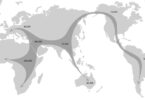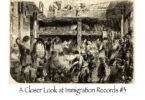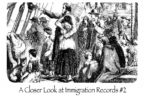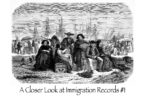If you don’t know what year your ancestor immigrated to the United States, or if you don’t know what port they used when they came, there are other ways you can search in order to find out more about their immigration, and life before and after they came to America. If you know or are reasonably sure, that your ancestor was in the United States in 1900, for example, you can check the 1900 US federal census for them, as this particular census lists the year of immigration for people who were not born in the United States.
Once you have the immigration year, you will have a much better idea of other sources you can search for the record. The year alone may tell you that you should search Castle Garden (or one of the lesser used ports during the time it was in operation) or Ellis Island for your ancestor’s immigration records. Once you have the record, which will show where your ancestor set sail from, and where they were from originally (if they had to travel to get to the port to get on the ship to America), you can look for records regarding them in their home country, and sometimes even home town. The home town is especially important in Ireland, where the church records at the local level may have a plethora on your ancestor and his or her family there. At the minimum, you must know the county they came from in Ireland, as all records in Ireland begin with the county.
Later census records show whether the person is an immigrant, and if so, whether or not they were naturalized. If you find that your ancestor was naturalized while looking at one of the US federal census records after 1900, you can search for their naturalization record. This record may give a scant amount of information on the person, or a vast and detailed amount of personal information, depending on where the naturalization was done. There were different courts in different states that did the naturalizations for people at the local and regional level, and each had their own way of doing it, in addition to the basics the federal government required. If you know the date of immigration, and know your ancestor was naturalized by a certain date, then you have a range of dates and a location (if you know where they lived in the United States) to search for an immigration record.
If you are extremely lucky, the immigration record will still be preserved in the family, either by someone you know, or by a relative on a collateral line descending from that ancestor who you can locate online to ask for a copy of the record for your research. If not, you can search the National Archives, as well as online genealogy websites, especially FamilySearch.org and Ancestry.com, to locate a plethora of naturalization records from various places in the United States.




